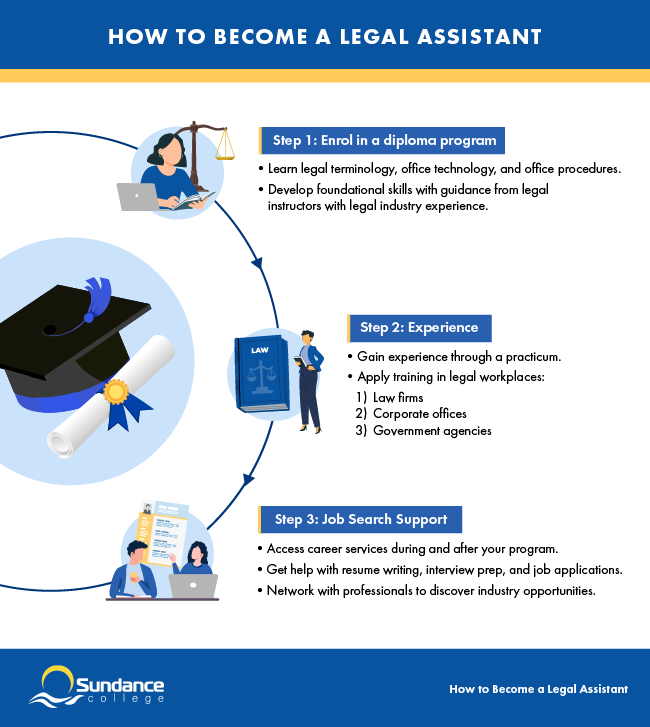Blog / How to Become a Legal Assistant in Canada: Step-by-Step Career Guide (2025)
How to Become a Legal Assistant in Canada: Step-by-Step Career Guide (2025)

Professional Legal Assistant Diploma
- Legal Assistant
- Legal Secretary
- Legal Administrative Assistant
Table of Contents
Imagine being a legal assistant, where your research, understanding of legal language, and attention to detail influence outcomes in custody arrangements, business contracts, or court proceedings.
Becoming a legal assistant in Canada involves learning legal concepts, building software skills, and understanding how legal processes work.
The legal assistant job outlook remains steady, making this a promising career path for those entering the legal field.
Before we get into the details of becoming a legal assistant, here’s what you need to know…
What is a Legal Assistant?
Legal assistants play a crucial role in law offices, handling administrative tasks and client services to keep operations running on track and on time. When you contact a law firm, they’re often the person who answers your calls, schedules appointments, and keeps you updated on your case.
Legal assistant duties typically include organizing documents, conducting legal research, and preparing case materials. For instance, you might research cases to support an attorney’s argument, prepare court filings, or coordinate schedules with witnesses.
The type of work you do can vary depending on your setting. Legal assistant work environments include law firms, corporate offices, courts, and government agencies. Some assistants support real estate transactions; others handle insurance claims or loan documentation. In every setting, your contributions help legal teams stay organized and perform to the best of their abilities.
Steps to Become a Legal Assistant
Now that you understand what a legal assistant does, let’s explore how you can join them in this important work. Follow these step-by-step guidelines to become a legal assistant through education, skill building, and hands-on experience…
Step 1. Legal Assistant Qualifications
Pursue the Right Education:
Christina B., a graduate of the Professional Legal Assistant program at Sundance College, emphasizes the impact of her legal assistant education on achieving career goals:
“The support from instructors and the program’s depth prepared me for my dream job as a legal assistant to the Crown prosecutor with the Government of Alberta.”
To meet the legal assistant qualifications that employers look for, the first step is earning a diploma. A focused legal assistant program teaches you legal terminology, how to use office software, and the procedures commonly followed in law firms, courts, and government offices. With this training, you’ll be ready to support legal professionals in their everyday tasks.
Step 2. Skills Required to Become a Legal Assistant

To succeed as a legal assistant, you’ll need a strong set of skills in legal procedures, research, and office management. Let’s take a closer look at these essential legal assistant skills:
- Legal Office Procedures
Understand processes in litigation, family law, real estate, and corporate law, including electronic filing systems. - Legal Terminology
Understand common legal terms to read, write, and interpret documents like trial briefs, living wills, and subpoenas. - Legal Research Skills
Learn to analyze legal documents, statutes, and case law, with a focus on accurate citation techniques.
Christina highlights, “Through my legal assistant training program, I gained hands-on experience in conducting legal research and writing.”
- Legal Software
Familiarize yourself with tools used for organizing legal documents and preparing cases. - Transcription Skills
Typing quickly and accurately, often between 50 to 100 words per minute, while maintaining proper grammar and spelling is essential for drafting legal documents. - Confidentiality
Handling sensitive client information requires professionalism and discretion. Legal assistants must protect all confidential details and ensure information is only disclosed when appropriate and necessary.
As you progress through your Legal Assistant diploma program, you’ll gain these legal skills and competencies, as well as hands-on experience in real-world legal settings.
Step 3: Job Search for Legal Assistant Roles
With your diploma and skills in hand, it’s time to find your ideal legal assistant role. This can be started during your Legal Assistant diploma studies, with the help of a good Career Services team.
When beginning your legal assistant job search, start by creating a standout resume, leveraging your new network of classmates and instructors, and focusing on high-demand locations:
- Create a Standout Resume
Highlight your education, legal assistant practicum experience, and specialized skills like legal software proficiency and research abilities. Write your resume to align with the specific requirements of each role.
- Leverage Networking Opportunities
Build your network by attending legal industry events, joining associations like the Alberta Association of Professional Paralegals, and engaging with professionals during your practicum for job leads.
- Search Strategically
Use online job boards, browse company websites, and focus on regions with strong demand for legal assistants.
Each of the steps you take helps your progress in your legal assistant career path, from building your qualifications to securing your first job.

Legal Assistant Practicum & Real-World Experience
Practicum placement is a key part of the legal assistant training program. It gives you the chance to apply your classroom learning to a legal setting, such as a law office, courthouse, or legal department, as well as gain that much-needed industry experience for your resume.
During your practicum placement, you may get to practice legal procedures and build confidence using the tools and communication skills developed throughout your training.
These experiences often lead to valuable connections and can even open the door to full-time job opportunities after completing your Professional Legal Assistant diploma.
For many students, the legal assistant practicum helps them decide which area of law they want to focus on, giving their career direction from the start.
Legal Assistant Average Salary and Job Outlook
As a legal assistant in Canada, you can earn as much as $80,000 yearly. The Legal assistant salary varies depending on your education, location, and workplace.
Provinces such as Ontario and Quebec generally offer higher salaries, and larger law firms typically provide better compensation than smaller ones.
The legal assistant job outlook also looks promising in the coming years, with an estimated 24,100 job openings by 2033, offering both job stability and room for career growth.
How a Career College Can Help You Succeed
Becoming a legal assistant requires specialized legal assistant education, skill-building, and preparation to enter the job market.
Sundance College’s Professional Legal Assistant Diploma program provides focused training in key areas of law, including civil litigation, family law, and real estate law. You’ll develop knowledge in legal research, document preparation, and office procedures to meet the demands of the field.
The legal assistant training program also includes a 5-week practicum, allowing you to apply your knowledge in a professional legal environment.
Christina shares, “I got excellent education support at Sundance College, and the instructors were top tier.”
To further support your success, Sundance College provides guidance through Career Services.
As Tim Harrison, Assistant Education Manager of Career Services, explains:
“We support students throughout their journey with resumes, interview preparation, and job search strategies to ensure they’re job ready.”
Take the first step toward your legal assistant career by connecting with an admissions advisor today.
How to Become a Legal Assistant FAQs
-
What is a legal assistant in Canada?
A legal assistant in Canada supports lawyers by managing administrative work and client communication in professional legal settings. They work on case files, draft documents, schedule appointments, conduct legal research, and prepare materials for court. You’ll find legal assistants in law firms, courts, government agencies, and corporate offices, helping legal teams stay organized and responsive to client needs.
-
What is the difference between a legal assistant and a paralegal?
Legal assistants take on a blend of administrative and legal duties. They are often responsible for drafting documents, conducting case research, organizing case files, managing schedules, and supporting communication between legal teams and their clients.
Paralegals tend to be more focused on legal procedures and case development, including more detailed legal analysis.
-
How to become a legal assistant through online programs in Canada? And what does it take to be a legal assistant?
To become a legal assistant through an online program in Canada, start by enrolling in a diploma program that offers flexible learning. A well-rounded program will cover legal terminology, office procedures, research skills, and legal software. It should also include a practicum so you can apply what you learn in a professional legal setting. Sundance College’s Professional Legal Assistant Diploma combines online coursework with work-integrated learning to make you job-ready.
-
What is the average salary for a legal assistant in Canada?
Legal assistants in Canada earn an average of about $50,000 per year, with experienced professionals making as much as $80,000 annually. Your earnings may vary based on factors like education, the province you work in, and the type of legal setting you’re employed in.
-
How to become a legal assistant with no experience or with a background in another field?
If you’re new to the legal field, a Professional Legal Assistant Diploma program can help you develop the skills needed to transition into a legal assistant career. These programs are suited for people from a wide range of backgrounds and cover topics like legal office procedures, research, document preparation, legal software as well as an exploration of legal fields such as family law, criminal law and more. Many also include a practicum, where you can gain the experience of working in a legal setting, even without prior experience.
-
How does a practicum placement benefit a legal assistant student?
A practicum gives legal assistant students the chance to apply their classroom learnings in a professional legal setting. It helps build workplace experience, introduce you to legal tools and office procedures, and grow your professional network. Practicum often leads to job opportunities and make graduates more competitive in the job market.
Related Blogs
Subscribe for more career advice
Blog Categories
Share on:
